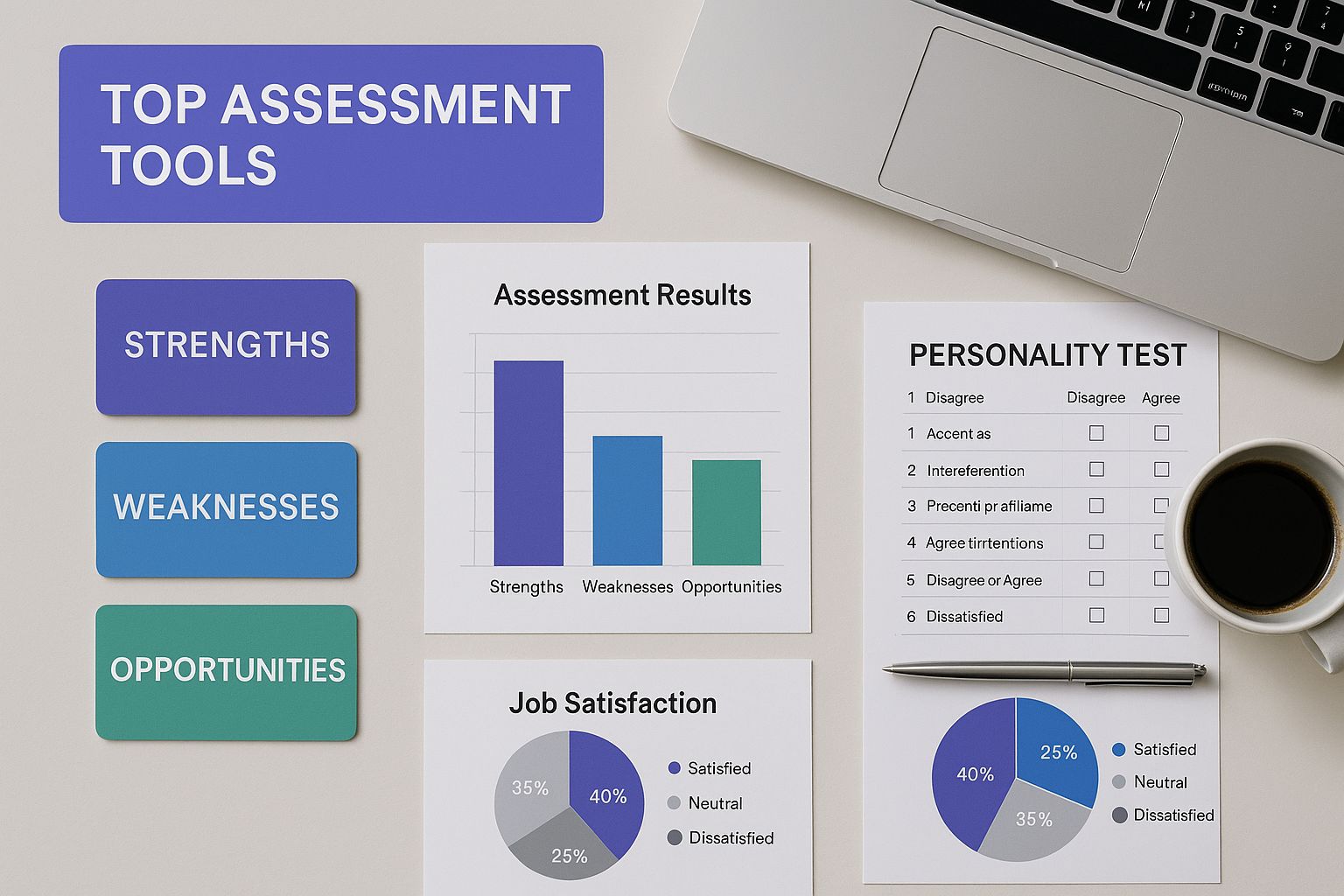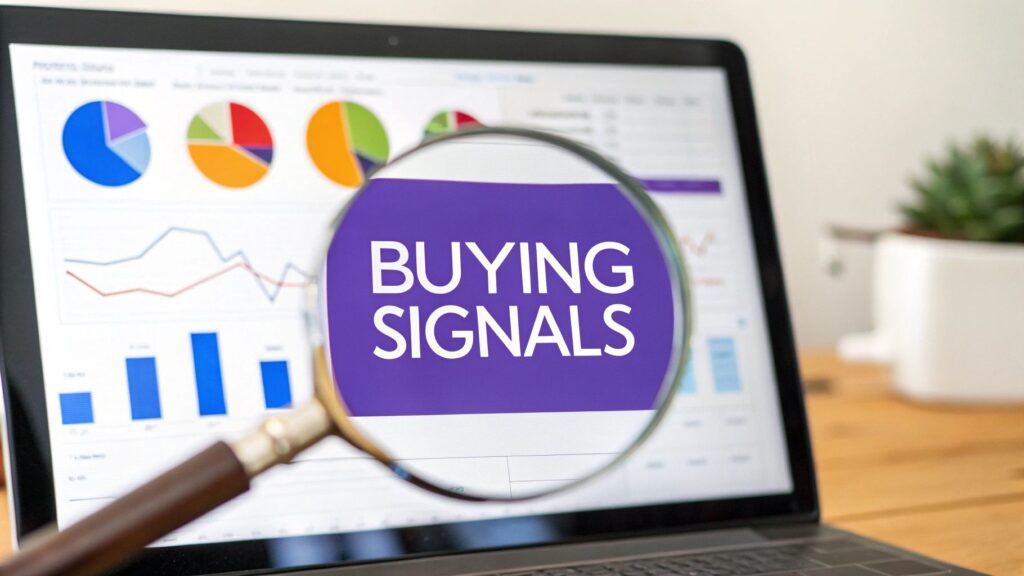Winning with Sales Personality Testing

- What Is Sales Personality Testing, Really?
- Decoding the Traits of Elite Sales Performers
- Choosing the Right Sales Personality Assessment
- How to Weave Personality Tests into Your Hiring Process
- Turning Test Insights into Powerful Sales Coaching
- Avoiding the Common Pitfalls of Personality Testing
- Frequently Asked Questions
A sales personality test is more than just another HR tool; it’s a strategic method to understand what truly drives a salesperson. It helps you move past the polished resume to uncover the core behavioral traits—like resilience, conscientiousness, and genuine empathy—that consistently predict who will succeed in a competitive sales environment. For example, a candidate might ace an interview, but a test could reveal a low resilience score, a critical insight for a role that involves frequent cold calling. This adds a powerful, data-driven layer to your hiring process, helping you build a team that isn't just skilled, but is actually wired to sell.
What Is Sales Personality Testing, Really?
Let's ditch the textbook definition for a moment. Think of sales personality testing as a scouting report for your sales team. A professional sports team would never draft an athlete based on their highlight reel alone; they analyze their innate abilities, their mindset, and how they handle pressure. In fact, teams like the NFL use the Wonderlic test to gauge cognitive ability under pressure. Sales personality tests do the same thing for your sales candidates, revealing the fundamental characteristics that a great interview might not.
It’s a structured way to understand someone's natural tendencies. Instead of just relying on gut feelings or a candidate's past experience—which can be deceiving—you get objective insights. For instance, a candidate with a decade of experience might have developed habits that don't fit your high-growth, agile sales culture. The test provides a neutral baseline, helping you see how a person is likely to perform when a deal goes sideways, how they’ll interact with demanding clients, and whether they'll genuinely click with your team's culture.
The Shift Toward Data-Driven Hiring
The modern sales world is brutal, and the cost of a bad hire is staggering. According to research from the Sales Management Association, the average turnover rate for salespeople is 34%, and replacing just one sales rep can set you back 1.5 to 2 times their annual salary. That kind of financial hit is pushing more and more sales leaders toward predictable, data-backed hiring methods.
You can see this shift in the market's explosive growth. The global personality assessment market was valued at around USD 5.62 billion in 2023 and is expected to skyrocket to USD 15.95 billion by 2033, growing at a CAGR of 11.2%. This isn't just a fleeting trend; it shows a fundamental change in how companies approach building winning teams. You can dig deeper into these market trends on Straits Research.
A sales personality test isn't about finding some mythical "perfect" personality. It's about finding the right personality for a specific role, team, and sales cycle. For example, the assertive, deal-closing traits that make someone a top-tier enterprise closer are often very different from the patient, relationship-building skills that make a successful inbound SDR thrive.
Uncovering the Intangibles
At the end of the day, sales personality testing helps you measure the intangibles that separate good salespeople from truly great ones. A resume tells you what a candidate has done in the past. A personality assessment helps you predict what they will do on your team.
This approach finally helps answer the critical questions that a traditional interview process often leaves to guesswork:
- How resilient are they? Can they actually shake off a tough rejection and get right back on the phone with the same energy?
- Are they genuinely curious? Will they ask the hard questions to uncover a customer’s real pain points, or just pitch features?
- How coachable are they? Do they listen to feedback and adapt their strategy, or are they stuck in their ways?
- What truly motivates them? Is it the thrill of competition, the power of collaboration, or the satisfaction of hitting a target? A study by Harvard Business Review found that top performers are often driven by a mix of empathy and ego drive.
By evaluating these traits methodically, you can make smarter hiring decisions, slash costly turnover, and build a more consistent, high-performing sales engine. It’s about adding science to the art of team building, ensuring you're not just hiring for skill, but for long-term success.
Decoding the Traits of Elite Sales Performers

What really separates a top-tier sales performer from the rest of the pack? It's almost never about having the slickest pitch or just being a "people person." Research from Objective Management Group, which analyzed over 2 million salespeople, shows that the top 5% share a distinct set of traits, and surprisingly, extraversion isn't a primary one. The real magic is in a handful of core behavioral traits that consistently predict who will crush their quotas.
Knowing what these traits are is the first step toward using sales personality testing to build a team of all-stars. When you look past surface-level skills, you can spot candidates who are naturally wired for sales and help your current reps play to their own strengths.
Let's pull back the curtain on the characteristics that truly define the best in the business.
The Bedrock Trait of Conscientiousness
Conscientiousness is the quiet, unsung hero of sales success. Think of it as a built-in sense of duty and organization that pushes a salesperson to do the right thing, every time, even when no one is watching. This isn’t about being a robot; it’s about being incredibly reliable.
A highly conscientious rep is the one who religiously updates the CRM after every single call—not because a manager is breathing down their neck, but because they know it’s crucial for tracking and follow-up. They show up to meetings prepared, anticipate the tough questions, and never let a promise to a client fall through the cracks. In a study published in the Journal of Applied Psychology, conscientiousness was found to be the most consistent predictor of job performance across all job types, including sales.
Think about the rep who sets a reminder to check in three months down the line, right when they know a client’s budget will renew. That one small, organized act, driven by conscientiousness, is what often wins the deal before competitors even get a foot in the door.
Unwavering Resilience in the Face of Rejection
Let’s be honest: sales is a numbers game, and "no" is a word you hear constantly. The average sales professional makes about 52 calls a day, and the majority of those don't result in a conversation, let alone a deal. Resilience is what allows a rep to take rejection on the chin and bounce back without losing steam or optimism. It’s the mental toughness to treat every new call as a completely fresh start.
Resilience isn’t just about having thick skin. It's an active mindset that reframes failure as a lesson. A resilient salesperson asks, "What could I have done better?" instead of spiraling into "I'm just not cut out for this."
Imagine a rep getting shot down five times before lunch. Someone with low resilience might feel defeated and mentally check out for the day. The resilient pro? They take a five-minute break, analyze what went wrong (e.g., "My value proposition was unclear"), and dial again with fresh energy, landing a killer discovery call on their sixth try.
The Power of Genuine Empathy and Curiosity
In today's world, empathy isn't a "soft skill"—it's a massive strategic advantage. It’s the ability to truly get inside a customer's head and understand their problems from their point of view. When you mix that with genuine curiosity, you get a powerful combination that uncovers needs the client didn't even know how to articulate.
- Empathy in Action: An empathetic seller hears a prospect mention a small frustration and immediately digs in. They'll ask things like, "That sounds tough. How is that actually impacting your team's day-to-day?" This simple shift turns a sales pitch into a real problem-solving conversation.
- Curiosity at Work: A curious rep doesn't just list product features. They ask probing questions like, "What would a perfect solution to this problem look like for you?" This helps them understand the why behind a customer’s goal, allowing them to craft a solution that delivers true value.
This one-two punch is non-negotiable. Research by Gong.io found that top-performing reps talk for 46% of a discovery call, while average reps talk for 68%. The difference? The top reps are listening and asking curious questions driven by empathy.
The Ultimate Growth Trait: Coachability
This might be the most important trait of all for long-term success: coachability. The sales world is always in motion—new technologies, new buyer behaviors, new competitors. A rep who is hungry for feedback will always run circles around a stubborn "expert" who thinks they know it all.
A coachable salesperson doesn't just accept feedback; they actively seek it out. They listen without getting defensive and immediately start working to implement the advice they're given. For example, after a call review, they'll say, "Okay, next time I'll try that open-ended question you suggested at the start," and then actually do it. They see coaching not as criticism, but as an investment in their own career. That mindset is what ensures they’re always getting better and staying ahead in a hyper-competitive field.
Choosing the Right Sales Personality Assessment
Stepping into the world of personality frameworks can feel a bit like learning a new language. You're suddenly surrounded by acronyms like DISC, MBTI, and OCEAN, and it’s easy to feel a little lost. But here's the secret: you don't need to be an expert in all of them. The real goal is to figure out which one gives you the most valuable insights for building a winning sales team.
Picking the right sales personality testing tool isn’t about finding one “best” option. It’s about matching the assessment to what you’re trying to accomplish. Are you looking for a relentless "hunter" to break new ground? Or maybe a patient "farmer" to nurture key accounts? Different tools are built to answer different questions.
This visual gives you a quick lay of the land, showing some of the most common assessment tools out there.

As you can see, each framework offers a unique lens for looking at a candidate's potential, from their core behavioral style to specific skills that translate directly to sales.
The Big Five (OCEAN) Model
If you’re looking for a scientifically solid foundation, the Big Five is it. Often remembered by the acronym OCEAN, this is one of the most respected and validated models in psychology. It gives you a stable, reliable picture of a person's core personality by looking at five key dimensions.
- Openness: Is this person curious and open to new ways of thinking? In sales, this often points to someone who can get creative when solving a client's problem.
- Conscientiousness: Are they organized, dependable, and disciplined? As noted earlier, this is a powerhouse trait for anyone who needs to manage a complex sales pipeline and follow up without fail.
- Extraversion: How outgoing and energetic are they? While it’s the classic "sales" trait, its importance really depends on the specific role—an inbound SDR might need less of it than an outbound field rep.
- Agreeableness: How well do they cooperate and connect with others? This is absolutely critical for team-based selling and building lasting client relationships.
- Neuroticism: How do they handle stress and setbacks? Low neuroticism (or high emotional stability) is what helps a rep bounce back from a lost deal and keep pushing forward.
The Big Five is fantastic for getting a fundamental read on a candidate, helping you predict overall job performance and reliability.
The DISC Model
The DISC assessment is a favorite in the corporate world, especially for sales teams, because it’s so practical. It’s simple, easy to understand, and gives you actionable insights into how people actually behave and communicate. It maps individuals onto a grid of four primary traits: Dominance (D), Influence (i), Steadiness (S), and Conscientiousness (C).
What makes DISC so useful is how directly it applies to sales roles. For instance, a candidate with a High D (Dominance) profile is typically assertive and results-driven—a perfect fit for a "hunter" role that’s all about chasing down new business. On the other hand, someone with a High S (Steadiness) profile is often more patient and supportive, making them a natural for an account management or "farmer" role. Understanding where these roles fit in the big picture is key, and you can learn more by checking out this guide on what is sales pipeline management.
The Myers-Briggs Type Indicator (MBTI)
You’ve almost certainly heard of this one. The Myers-Briggs Type Indicator (MBTI) is arguably the most famous personality assessment out there, sorting people into one of 16 distinct personality types based on four different scales (like Introversion vs. Extraversion).
While it's incredibly popular for team-building exercises and sparking self-awareness, the MBTI is generally not the best tool for predicting job performance in a sales role. Most organizational psychologists caution against its use in hiring due to its lack of empirical validation for performance prediction. Its real value is in helping team members understand each other’s communication styles and work together more effectively, rather than forecasting who will hit their quota.
Remember, the aim isn't to build a team of clones who all share the same personality. The best sales floors are a healthy mix: the driven closer, the methodical relationship-builder, and the creative problem-solver. A 2018 study by the Chally Group found no single personality profile for top sellers; success came from diverse styles. The right testing framework helps you build that perfect blend.
How to Make the Right Choice for Your Team
So, which one is right for you? It all comes down to what you need to know. Are you looking for a scientifically proven predictor of long-term success? Or a simple tool to help your team communicate better?
This table breaks down the key differences to help you decide.
Comparison of Popular Personality Assessment Frameworks
| Framework | Core Focus | Best Use Case in Sales | Key Limitation |
|---|---|---|---|
| The Big Five (OCEAN) | Stable, core personality traits | Predicting overall job performance, reliability, and conscientiousness. | Less focused on specific behavioral styles in team contexts. |
| DISC | Observable behaviors and communication styles | Matching candidates to specific sales roles (e.g., hunter vs. farmer) and improving team communication. | Can be less nuanced than the Big Five and is not as predictive of long-term success. |
| MBTI | Deeper personality preferences and cognitive functions | Fostering team-building, improving interpersonal understanding, and personal development. | Limited scientific validation for predicting specific job performance or sales success. |
At the end of the day, the smartest approach is often to use an assessment built specifically for sales—one that measures the traits we know lead to success, like resilience, drive, and coachability. When you combine those data-driven insights with a great interview process, you're not just making a good hire; you're making a strategic one.
How to Weave Personality Tests into Your Hiring Process
Bringing a sales personality test into your hiring process isn't about creating another hoop for candidates to jump through. It's about getting smarter and more predictive with your hiring. When done right, these assessments give you incredible insight without turning off the very people you want to attract.
Think of the test results not as a pass/fail exam, but as a conversation starter. The report gives you a data-backed roadmap to dig deeper in your interviews, helping you get past the polished resume to see who the candidate really is. This simple shift can completely change your ability to spot people who will truly click with your team and your sales environment.
Pinpointing the Right Moment in the Hiring Funnel
When it comes to these assessments, timing is everything. Introduce it too early, and you might scare away great candidates with a long-winded application. Wait too late, and you’ve missed the chance to use the results to guide your most important interviews.
The sweet spot is usually after the initial phone screen but before the final round of interviews.
This approach just works. Here's why:
- It’s an effective filter. The first phone call confirms they meet the non-negotiables—experience, core skills, salary expectations.
- It gives you powerful insights. You get the assessment results right when you need them most, allowing you to prep targeted questions for the deeper interviews. For example, if a report flags low empathy, you can plan a role-play scenario to observe how they handle a difficult customer.
- It respects their time. This shows you’re serious about them as a candidate. You're investing in a real evaluation, not just using a test as a cold, impersonal gatekeeper.
Following this sequence means that by the final interview, you have a complete picture. Their resume tells you what they've done, the phone screen reveals how they communicate, and the personality test offers clues into how they’re wired to sell.
Use the Results as a Guide, Not a Verdict
One of the biggest mistakes managers make is treating these scores as the final word. A low score in an area like assertiveness doesn't mean an automatic "no." It should make you curious. It should become a key part of your interview.
The real power of a sales personality assessment is turning data points into meaningful dialogue. The report isn’t the decision; it’s the beginning of a much deeper, more insightful conversation about fit and potential.
For example, don't just think, "This person scored low on resilience, they won't last." Instead, turn that into a direct, insightful question.
Try asking, "Tell me about a time you faced a string of rejections or lost a deal you were sure you'd close. How did you handle that, and what did you do the next day?" Their real-life story will tell you far more than a number on a chart ever could.
Turning Data into Targeted Interview Questions
This is where the magic really happens. With a test report in hand, you can stop asking generic questions and start probing the areas that matter most. It's no wonder the market for these tools is booming. The personality assessment software market, valued at around USD 2 billion, is expected to triple to nearly USD 6 billion by 2033. Companies are hungry for objective ways to find the right talent, and you can learn more by exploring the latest personality assessment software market trends.
Here’s how you can turn assessment results into fantastic interview questions:
- Low score on Conscientiousness? Ask: "Walk me through how you organize your typical week. What tools or systems do you use to make sure that no follow-ups or admin tasks fall through the cracks?"
- High score on Agreeableness? Ask: "Describe a time when you had to push back on a client's unreasonable request. How did you articulate your position while preserving the relationship? What was the outcome?"
- Resilience looks a bit low? Ask: "Tell me about your biggest professional failure. What did you learn from it, and how did it change your approach moving forward?"
By building testing into your process this way, you create a dynamic, evidence-based conversation. You can validate a candidate's strengths, explore potential blind spots, and ultimately make a much more informed decision based on the whole person, not just their resume.
Turning Test Insights into Powerful Sales Coaching
A sales personality test isn't just a hiring tool—its real value kicks in after someone joins the team. Think of the data you collect during the interview process as a detailed roadmap for coaching. It’s your key to turning good salespeople into truly great ones.
Instead of putting everyone through the same generic training, these assessment results let you zoom in on the specific areas where each person can grow. It’s like a personal trainer using a fitness assessment to build a custom workout plan. You wouldn't make the entire gym do the same exercises; you target the muscles that need the most work.
This data-driven approach is quickly becoming the norm. The online personality testing market was valued at USD 2.5 billion and is expected to more than double, hitting USD 5.6 billion by 2033. This explosion shows a clear shift toward using real data to help people grow in their careers. You can find more details about this expanding market on Verified Market Reports.
From Weakness to Strength Through Targeted Coaching
One of the best ways to use post-hire test data is to turn potential weaknesses into focused coaching opportunities. A low score in a key area isn't a deal-breaker. It’s a signpost showing you exactly where your coaching will make the biggest difference.
The goal isn't to change someone's core personality. It's to give them the tools, strategies, and self-awareness to succeed with their natural style. A thoughtful coaching plan builds on strengths and mitigates weaknesses.
Let's look at how this plays out in the real world:
- Low Assertiveness Score: Maybe a rep hesitates to push back on unreasonable demands or gets nervous when stating their price. A good coaching plan would involve role-playing tough negotiations, giving them specific phrases to use (e.g., "Our pricing reflects the value and ROI you'll see in the first six months."), and letting them shadow a more assertive senior team member.
- Low Resilience Score: This person might take rejection hard, which can kill their motivation. Coaching here would be all about mindset. You'd help them reframe a "no" as a learning experience (e.g., "What's one thing we can learn from that lost deal?") and develop routines to bounce back fast, like a quick walk or reviewing a recent win.
By pinpointing these specific spots, you can provide support that actually helps, rather than offering generic advice that goes in one ear and out the other.
Building Smarter Sales Teams and Assigning Leads
Looking at the personality data for your whole team gives you a powerful strategic advantage. When you understand the collective personality profile of your sales floor, you can start building more balanced teams and even improve how everyone communicates.
For instance, you might realize your team is full of competitive "hunters" but lacks empathetic "farmers." That's a huge insight. Now you know to hire for complementary traits or create sales pods where a high-conscientiousness rep can handle follow-ups while a high-dominance rep focuses on closing.
It also changes how you hand out leads. A complex, long-cycle deal that needs a lot of relationship-building is probably a perfect fit for a rep who scores high on patience and agreeableness. A high-velocity, transactional lead might be better for someone with high urgency and dominance. Strategically assigning leads like this can boost your close rates significantly and ensures you're maximizing every opportunity—a key part of smart sales. If you want to sharpen your outreach, our guide on sales prospecting best practices can help.
Ultimately, using sales personality tests for coaching ensures your investment pays off long after someone is hired. You end up with a more skilled, self-aware, and successful sales organization.
Avoiding the Common Pitfalls of Personality Testing

While sales personality testing can be a powerful addition to your hiring process, it's no magic wand. Like any tool, its effectiveness depends entirely on how you use it. Get it wrong, and you risk making bad hires, losing the trust of great candidates, and even running into legal trouble.
The single biggest mistake is when managers treat assessment scores as the final word. A test result should never be the only reason you hire or reject someone. For example, don't automatically reject a candidate who scores as an "introvert." Author Adam Grant's research found that "ambiverts" (those in the middle) actually outperform strong extraverts in sales. Think of it as just one data point in a much larger picture—it’s meant to start a conversation, not end one.
Ensuring Test Validity and Fairness
Another huge pitfall is picking the wrong assessment. They are not all created equal. Grabbing a generic, unvalidated quiz you found online is asking for trouble. It's crucial to select assessments that are scientifically validated, meaning they are proven to actually predict performance in a sales role.
A validated test is your best defense against making biased decisions. These tools have been rigorously studied to ensure they measure what they claim to measure and are fair across different demographic groups, protecting your company from potential legal challenges related to discrimination under agencies like the EEOC.
You also have to think about candidates trying to "game the system." Most people can guess the "right" answer. The best sales assessments have built-in safeguards to catch this, like forced-choice questions (e.g., "Which are you more like: competitive or collaborative?") or consistency checks that flag contradictory responses. This gives you a much more honest look at a candidate's real behavioral style.
Navigating Ethical and Legal Lines
Finally, using these tests ethically is non-negotiable. Their purpose should be to open doors and identify potential, not to create stereotypes or pigeonhole people. Be upfront with applicants about why you're using the test and how the results fit into the bigger picture of your hiring process.
To keep your process strong and fair, stick to these core principles:
- Use tests to supplement, not replace, human judgment.
- Always choose scientifically validated and EEOC-compliant tools.
- Treat the results as a guide for asking smarter interview questions.
- Train your managers on how to read the reports without bias. For instance, train them to see a low score not as a "flaw" but as a "potential coaching area."
By carefully navigating these potential issues, you can build a testing program that’s both effective and responsible. This balanced approach doesn't just help you find top talent; it also shows your company is committed to fair and insightful hiring. As you fine-tune your outreach, consider pairing these insights with top-tier B2B lead generation tools to give your team every advantage.
Frequently Asked Questions
When you start digging into sales personality testing, a few practical questions always pop up. Let's tackle some of the most common ones that sales leaders ask when they're ready to get smarter about hiring and coaching.
How Much Do Sales Personality Tests Cost?
The price tag on these tests is all over the map. You can find everything from free online quizzes to comprehensive, enterprise-grade systems. Honestly, you tend to get what you pay for. The free or cheap options might be fun, but they rarely have the scientific backing you need for making a critical hiring decision.
For a properly validated assessment, you should expect to invest anywhere from $50 to over $200 per candidate. Most providers offer bulk pricing or subscriptions that bring that per-person cost down, making it much more feasible to build it right into your hiring process. The ROI becomes clear when you consider that the cost of a single bad hire can exceed $100,000.
Are These Tests Scientifically Valid and Reliable?
The good ones absolutely are. The key is choosing the right tool. High-quality assessments are built on a solid foundation of psychometric research to ensure they are both valid (meaning they actually measure what they say they're measuring) and reliable (meaning the results are consistent and not just a fluke).
Always look for a provider that is transparent about their research and can show you proof that their test actually predicts success in a sales role. Ask for technical manuals or validation studies. Steer clear of generic personality quizzes—they simply don't have the scientific rigor needed for fair and effective hiring.
A scientifically validated test isn't just a nice-to-have; it's your best defense against hiring bias and ensures you're making decisions based on objective potential, not just a gut feeling.
Will Personality Testing Hurt the Candidate Experience?
It’s a common concern, but when handled thoughtfully, it can actually improve the candidate experience. Think about it: top candidates want to know they’re joining a company that takes hiring seriously. A professional and thorough process signals that you value finding the right fit for both sides.
The trick is to frame it correctly. This isn't a pop quiz; it's a tool to find the perfect mutual fit.
To make sure it’s a positive step:
- Be transparent. Let candidates know why you're using the test and what you'll do with the results. No surprises. A simple script could be: "As a next step, we use an assessment to understand your natural work style to ensure this role is a great fit for you."
- Respect their time. Pick a test that's concise, ideally one that can be completed in 15-20 minutes.
- Share the insights. You don't have to give them the full report, but offering a high-level summary of their strengths can make for a fantastic, engaging conversation during the interview.
Ready to build a high-performing sales team with data-driven insights? FundedIQ delivers curated lists of recently funded startups, giving you direct access to high-intent leads at the perfect moment. Stop guessing and start engaging with companies ready to invest in growth. Visit FundedIQ's website to see how our actionable intelligence can accelerate your deal flow.





